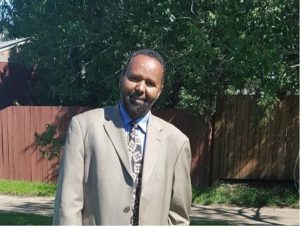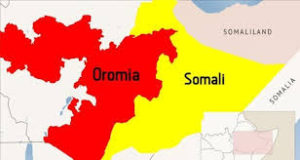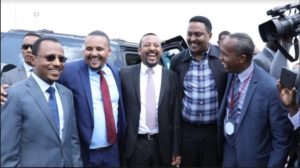Editor’s Note: Hassan Abdullahi Duale “Hassan Jabhad” is a Somali community activist, intellectual, and a former freedom fighter in the national liberation movement in Western Somalia, now the Somali State of Ethiopia. A graduate of Gahayr University and an economist by training, Duale worked for the Central Bank of Somalia in the Economic Research Department. He is considered a knowledgeable regarding the history and political activism of Somalis in Ethiopia. On September 3, 2018, while in Canada, Duale talked with Wardheernews contributor Hassan M. Abukar on the phone. For the purposes of brevity, the following is a condensed version of that long interview.
__________________________________-
WardheerNews (WDN): How do you assess the current changes taking place in Ethiopia led by Prime Minister Abiye Ahmed?
Hassan A. Duale: There are actually ongoing changes that have been taking place in Ethiopia for decades. In the beginning, the country was run by a succession of monarchies and featured feudalism. However, a reform movement led by university and high school students arose in the early 1970s which called for three major changes: the end of the monarchy and feudalism, and a genuine attempt to address the issue of nationalities. Unfortunately, in 1974, Colonel Mengistu Haile Mariam and his military colleagues staged a coup and hijacked the demands of the student activists.

The new rulers succeeded in abolishing the monarch and many aspects of the feudal system in the country, but they deliberately avoided tackling the issue of the nations and nationalities many of whom were oppressed and disenfranchised. However, in 1991, a new leadership led by Meles Zenawi and his Ethiopian People’s Democratic Revolutionary Front (EPDRF) came to power and, for the first time, addressed the issue of the nations and nationalities. The new rulers instituted ethnic federalism and gave each major nationality the autonomy to run its region.
WDN: But what does the new prime minister and his changes mean to the Ethiopians and especially to the Somalis?
Duale: Abiye Ahmed is a young, dynamic leader, but let us not forget that he is the product of an Oromo uprising in Ethiopia. The Oromo are the largest ethnic group in the country, with a population of roughly 40 million people. Ahmed’s rise to power was the result of an unholy alliance between two ethnic groups, the Oromo and the Amhara. They are united against the Tigre-dominated group, which has ruled Ethiopia since 1991.
When Meles Zenawi came to power in 1991, the ruling EPDRF was a coalition of various ethnic groups, but in reality, there were four (Amhara, Oromo, Tigre, and Southern People) major ethnic groups that constituted the ruling party; Somalis and other nationalities were marginalized. The Oromo were part of the ruling coalition, but they were not dominant. For the past few months ago, Oromo nationalism reached its zenith, and its emergent power came to the fore. Now, this ethnic group is flexing its muscles and asserting its power. Prime Minister Ahmed is an integral part of this larger Oromo new-found power.
WDN: How does the new Oromo assertiveness and growing power affect Somalis in Ethiopia?
Duale: The new political changes in Ethiopia has opened a Pandora’s Box. Various nations and nationalities, which have historically been at odds with each other, are engaged in conflicts. There have been border disputes within Ethiopia: Oromo against Amhara, Amhara against Tigre, Oromo against Somalis, Oromo against Afar, Somalis against Afar, and so on. Since Ahmed came to power, there have been at least 2.5 million internally displaced people in Ethiopia.
This has all had a negative impact on Somalis. The Oromo have been engaged in violent attacks against Somalis, especially in areas like Jinacsani, Tulli-Guled, Babille, and Moyale. Hundreds of Somalis have been killed, and many others were uprooted by Oromo armed militia groups. In short, there is a growing Oromo expansionism to what once were Somali territories.
WDN: Is this a conflict between Somalis and the Oromo or, as some say, a communal strife between the Geri and the Jaarso, or the Garre against the Boran?
 Duale: No, this is a conflict between the Oromo and the Somalis. The Ethiopian rulers had arbitrarily drawn regional borders among various ethnic nationalities in an attempt to divide and rule. There were other factors that may have led to some demographic changes, such as the war between Somalia and Ethiopia in 1977-1978, when many ethnic Somalis temporarily left their homes due to the war and upon their return, found that Oromo had moved into these historically Somali areas. The Mengistu regime aided and abetted the resettlement of some Oromo in Somali towns and that created tensions between Somalis and Oromo.
Duale: No, this is a conflict between the Oromo and the Somalis. The Ethiopian rulers had arbitrarily drawn regional borders among various ethnic nationalities in an attempt to divide and rule. There were other factors that may have led to some demographic changes, such as the war between Somalia and Ethiopia in 1977-1978, when many ethnic Somalis temporarily left their homes due to the war and upon their return, found that Oromo had moved into these historically Somali areas. The Mengistu regime aided and abetted the resettlement of some Oromo in Somali towns and that created tensions between Somalis and Oromo.
WDN: The Jaarso leaders claim they have territorial issues with the Geri, and the conflict is not between Oromo and Somalis. Moreover, they have stated they do not have territorial problems with other Somali clans, such as the Isse or the Jidwaaq. How do you respond to that?
Duale: That is not preposterous. Historically, the Geri have inhabited the very areas that the Oromo are now encroaching upon. In 1856, Richard Burton, the famous English explorer and the author of, “The First Footsteps in East Africa,” met with the Geri chieftain in what is now Jinicsani. In 1948, Tulli-Guled was the center of Somali nationalism and the headquarters of the Somali Youth League (SYL). The current Oromo expansionism into Somali territories is not the work of the Jaarso community, it is due to the evil machinations of the Oromo leadership. In other words, the Jaarso, who speak Somali, are being used by the leadership of Oromia who are bent on grabbing Somali land. The Jaarso came to Gerri land in the early 1900 to work in farms. They were welcomed and the two communities had one Geri chieftain. Unfortunately, the Jaarso claim to be Somali, when it suits, and Oromo when convenient. These days, they are adamant to identify with the rest of the Oromo.
The Geri and the Jaarso shared 114 “Qabele” (electoral units) within the Jigjiga region. Unfortunately, the Jaarso won 43 electoral units in a lopsided referendum, which led to the historically Somali towns being incorporated to Oromia. Sadly, the conflict between the Oromo and the Somalis is not centered on areas the Oromo had unjustly annexed into Oromia, but on the areas that were not in dispute—areas that had voted Somali. The Oromo are now at loggerheads with Somali clans such as Karanle, Marehan, Isse, Dagodi, Geri, and Ogaden. This illegal expansion of the Oromo is an existential threat to the Somali people. I hope the Somalis and their territories are not wiped out from the map!
It is like Mexicans who, for example, would inhabit an area like Oregon in the United States and then, after many years, claim that the very American land they had inhabited should be ceded to Mexico.

WDN: What are the misconceptions many people have about the Somalis in Ethiopia?
Duale: There are three misconceptions about the Somali region in Ethiopia. First, the conflict between the Oromo and Somalis is tribal, a point which we discussed. Unfortunately, some Somalis, who are Oromo apologists, peddle this false notion. Second, it is a conflict about the borders between Oromia and the Somali region. The areas of conflict between the two ethnic groups is actually in the heartland of the Somali region, not on its border with Oromia. This shows the Oromo expansion in the heart of the Somali region is growing. We are talking about clashes two kilometers away from Jigjiga, 30 or 40 kilometers north of Jigjiga and even 15 kilometers from Tog Wajale.
In the 2004 referendum which was held in the Somali districts in which the Oromo had encroached, the Oromo succeeded in having 11 Somali districts, which included Jinacsani, annexed by Oromia. Then Prime Minister Meles wanted to pacify the Oromo Peoples’ Democratic Movement (OPDM), and hence did not object to such a gross land-grabbing by the Oromo. Most of all, the Ethiopian federal parliament had at the time a two-thirds Oromo representation and that facilitated the transfer of Somali land to Oromia. Third, there are some who mistakenly believe that Abdi Omar, the former president of the Somali region, is the one who started the conflict between the Oromo and the Somalis. Nonsense. In fact, as far back as 1983, there were armed skirmishes between the Oromo and the Somalis, just as in 1993.
WDN: What is the long-term goal of the Oromo?
Duale: The Oromo want to expand into Somali territory until they reach the Red Sea. Ethiopia is a land-locked country and, unfortunately, the Oromo see the Somalis as numerically inferior and, therefore, ripe to be swallowed. Currently, there are thousands of Oromo inside Somalia working in Somaliland, Puntland, and even central Somalia. The Oromo want to expand slowly and incrementally until they overtake these Somali territories. Oddly, the Oromo have a tendency to first inhabit an area and then claim such territory to be theirs. It is unfortunate that calls by Oromo fanatics such as “from Moyale to Jinicsani” are music to the ears of the Oromo expansionists.
Read more: Hassan Jabhad: An Interview
WardheerNews
Email: [email protected]
We welcome the submission of all articles for possible publication on WardheerNews.com. WardheerNews will only consider articles sent exclusively. Please email your article today . Opinions expressed in this article are those of the author and do not necessarily reflect the views of WardheerNews.
WardheerNew’s tolerance platform is engaging with diversity of opinion, political ideology and self-expression. Tolerance is a necessary ingredient for creativity and civility.Tolerance fuels tenacity and audacity.
WardheerNews waxay tixgelin gaara siinaysaa maqaaladaha sida gaarka ah loogu soo diro ee aan lagu daabicin goobo kale. Maqaalkani wuxuu ka turjumayaa aragtida Qoraaga loomana fasiran karo tan WardheerNews.
Copyright © 2024 WardheerNews, All rights reserved


